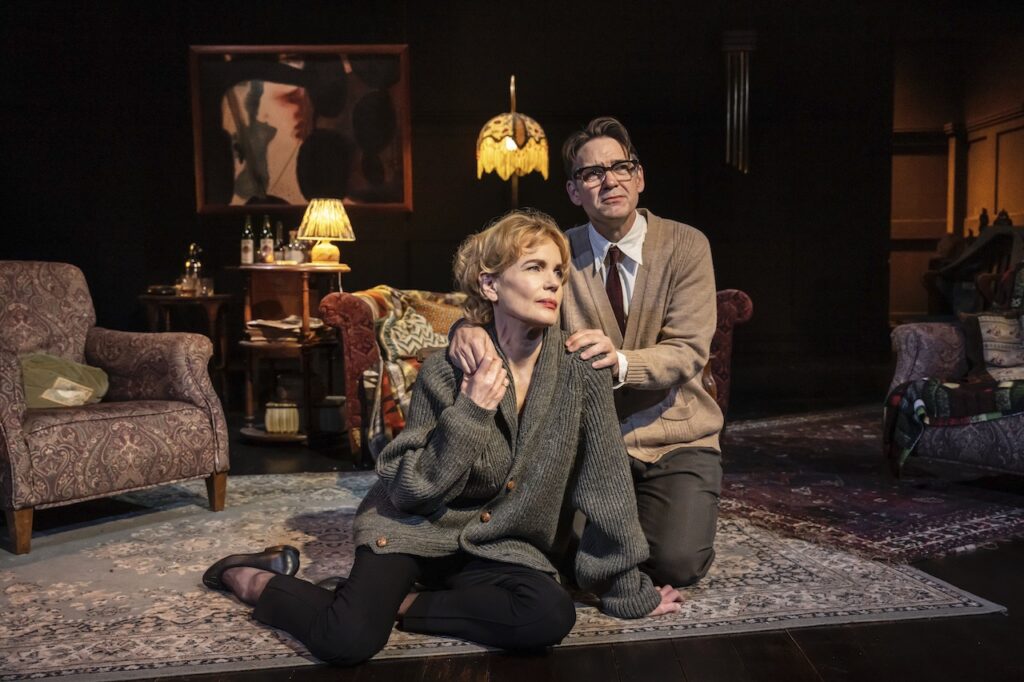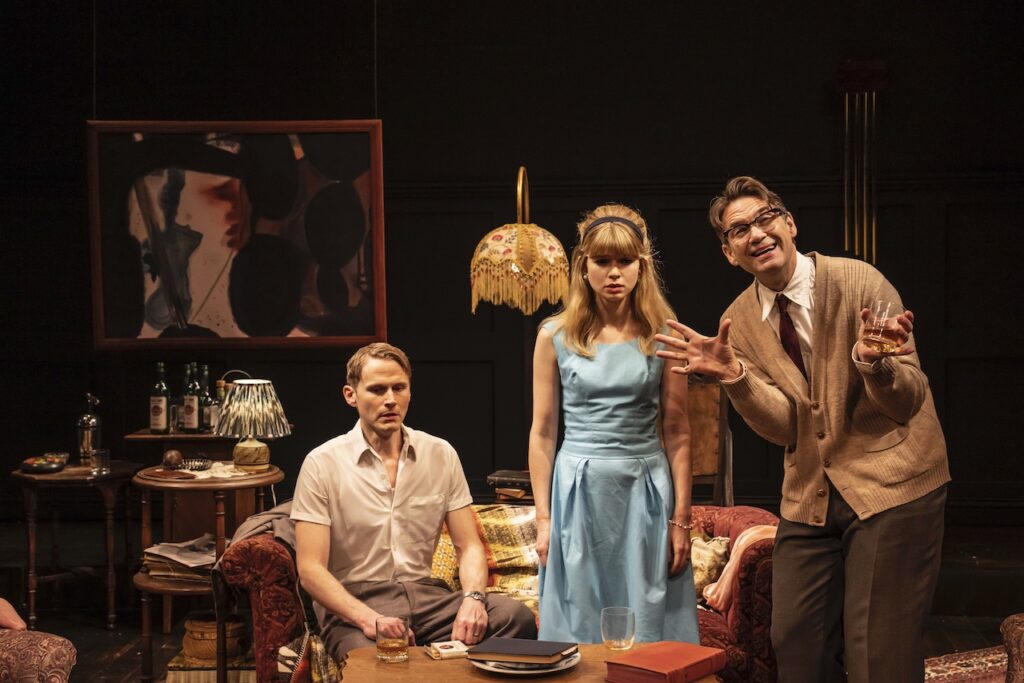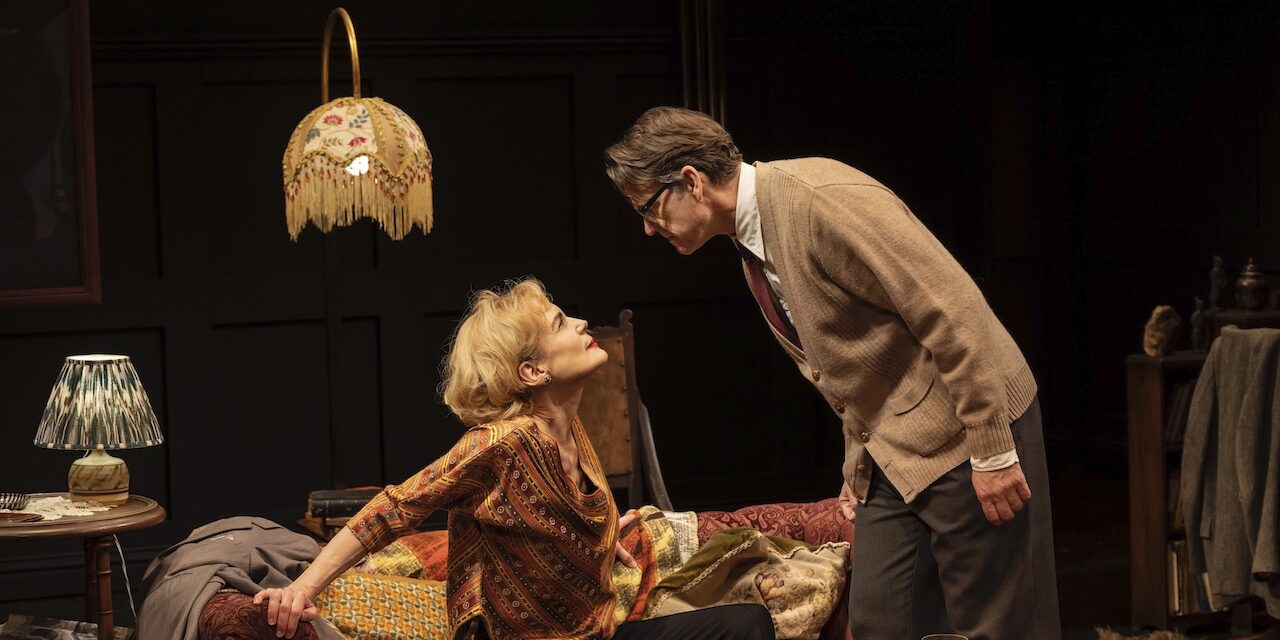
13 January – 11 February
‘Everybody plays games’ said Edward Albee, and in Who’s Afraid Of Virginia Woolf? he depicts a middle-aged married couple, George and Martha, for whom game-playing has become the modus operandi of their combative relationship. The rules of these distinctly unsporting encounters are known only to them, but late one evening, after a university faculty party, they draw two younger unsuspecting guests into becoming reluctant participants. Bath’s Ustinov Studio is an ideal venue for this play, being small enough to bring the audience close to the action, thus helping to create an almost claustrophobic sense that we too are being drawn into George and Martha’s world of rancorous no-holds-barred verbal combat.
Elizabeth McGovern, known to many as Lady Cora in Downton Abbey, is a sharp-edged, angular Martha, with a voice that could slice through steel. Before her guests have arrived, she berates George for not remembering the title of a Bette Davis movie. Her attack seems entirely unjust, as she has forgotten it herself, but it quickly becomes clear that unfairly criticising George is her way of provoking him into a response. George is a rumpled, bespectacled academic, an associate professor of history in a college headed by Martha’s father. Slumped in an armchair, Dougray Scott gives George the defeated air of someone long resigned to life’s disappointments, well-used to being taunted by Martha for not having risen further in academia. So far, so domestic, but ‘George’ and ‘Martha’ were the names of America’s first President and his wife, so there is a political dimension to giving their names to a couple whose marriage is not, by any ordinary measure, a success. That broader dimension is underlined by Albee calling the college New Carthage, in reference to the once great Punic city famous for its decline.
If George and Martha in some way represent the failure of the American Dream, their young guests would initially seem to be that dream personified. Clean-cut Nick is a biologist with drive and ambition, and not long married to Honey, who seems as sweet as her name. They have a puppyish eagerness to please, and seem happily well-matched but, as the booze flows, we discover fissures in their relationship which will surely widen in the years to come. Charles Aitken brings real substance and complexity to the role of Nick, and Gina Bramhill creates a Honey with far more depth than at first meets the eye.

In the first two acts George and Martha’s relationship seems to be characterised by their mutual indulgence in unrestrained, frank expression of their hostile feelings towards each other. They appear to share a cruel kind of honesty. Yet by the final act it becomes clear that their marriage has been sustained, not so much by honesty, but more by their joint indulgence in a private fantasy. ‘Truth and illusion – you don’t know the difference but we must carry on as if we do’. There is an entirely imagined world into which they escape from some unpleasant truths about themselves. It might be thought that the USA of today is equally prone to indulging in fantasies. ‘Mankind cannot stand too much reality’ wrote Eliot, and Albee was surely making a similar observation about his homeland that remains true sixty years later.
At one point George admits that their behaviour ‘isn’t the prettiest spectacle’, but the grimness of the verbal battles is frequently relieved by comedy. Admittedly, that is often of the darkest kind, but there’s knockabout stuff too. In the early stages some gestures and shifts in tone were a little awkward, creating some uncertain moments, but by the second act a satisfying rhythm had been established, and all four actors become entirely convincing in their roles. At three hours long, Who’s Afraid Of Virginia Woolf? can threaten to be a test of endurance, but under Lindsay Posner’s direction his is a thoroughly engaging production of a great play.
★★★★☆ Mike Whitton, 18th January, 2023
Photo credit: Johan Persson


